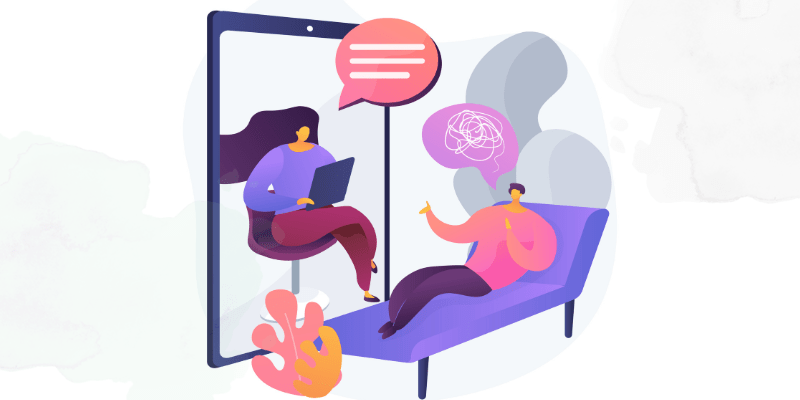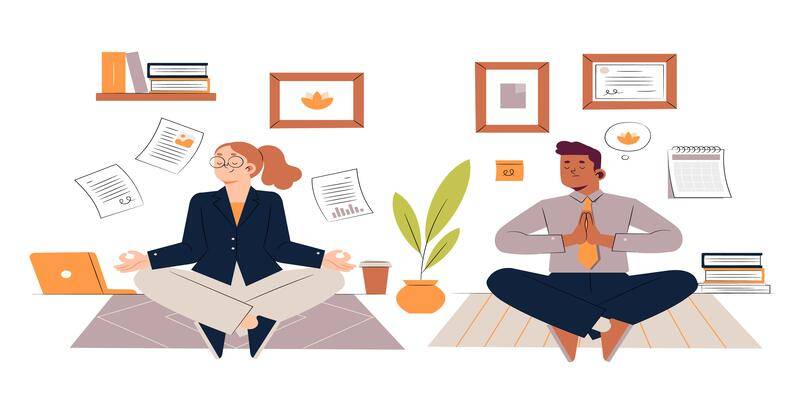Future of online therapy – is it here to stay?

With the COVID-19 pandemic, almost everything has primarily shifted to online platforms. From school classes to office meetings to sessions related to fitness, baking, dancing, makeup etc., we have changed from a face-to-face world to a hybrid one. Online therapy is one of the many things that has caught everyone’s attention. It has sort of become a “thing” now. Obviously, there are pros and cons to everything on the face of this Earth, and online therapy is no different.
Therapeutic relationships and therapy rooms are no longer confined to just four walls anymore. This has enabled people from across the globe to access therapy from their home/laptop screens. Not just that, the amount of client inflow has improved significantly in the last few months because of the pandemic. To answer the title of the article, online therapy is here to stay. Let’s understand why.
The pandemic struck us without any notice or ultimatum. The COVID-19 virus is such an alien concept that even though it has been more than two years, it still feels fresh. Everyone is still fearful and cautious with their health: wearing masks, opting to work from home, and not stepping out unless absolutely necessary. Still, we hear covid stories of people around us, and those haunt us. All this has brought up a lot of suppressed emotions in people for their families, friends, and partners. Some are also dealing with the grave loss of their family or friends and the unsurmountable pain attached to it.
Living with your family and not having the option to step out has been a boon for some and a bane for others. And for a few others, it has been a downright horrible experience. Cases of domestic abuse have touched the roof and cases of violence and sexual trauma are being reported since the rise of the virus. All these feelings, emotions, behaviours, and situations have led to an increase in online therapy.
In many ways, therapy has become accessible to people who can’t visit their therapists at the clinic or the centre but can make use of this service while sitting at home. This has reduced travel time to a large extent; it has become extremely easy to book sessions even during weekdays when most people are working a 9-5 shift. I have seen many clients who are very regular with their weekly sessions because they have the liberty to work from home, study from home, be at the comfort of their home and avail such services online.
I have also observed how, now that therapy is making a shift to online platforms, people have more options to choose from. Earlier, in the pre-pandemic era, a person had to look for a therapist in their vicinity to ensure that they were not wasting time on travelling and also needed to see if the therapist was within their budget. But now, they have the liberty to choose a therapist of their liking, someone who looks like them, talks like them, is from their ethnicity, or specifications, like therapists of colour, trauma-informed therapists, and queer-affirmative therapists. Options are plenty today, and we have the liberty to choose amongst these, find the right fit and carry on with the sessions. We see how there are so many benefits to teletherapy, but in-person therapy has its own charm and pros. A lot of times we can see that there are many things that are amiss in teletherapy. Let’s have a look at some of the cons.
How can we forget about those who don’t have proper access to the internet and digital technology? It has become difficult for the elderly and for people who come from lower-middle-class families to afford online therapy due to a lack of proper connectivity and/or budget issues. These pressing issues get overlapped by the incoming of online therapy and how it has made a world of difference to a large majority of people, especially the millennials.
There are always these privacy issues. You’re at home, and your practitioner is at their home. What if your therapist’s partner is eavesdropping on the conversation? Or your sister is passing by while you are in a deep, vulnerable conversation with your therapist? What about those individuals who haven’t told their parents or their friends that they seek therapy? Privacy can feel like a challenge to many people. A lot of the clients I see don’t share this with their parents and are very concerned about confidentiality and privacy during such sessions.
Another concern is that of the quacks. Quacks is a very millennial term used for individuals who pose as therapists or doctors but do not possess the educational qualifications or training to provide therapy. During the pandemic, we saw a rise of such quacks coming out in the garb of fashion influencers, lifestyle bloggers, and life coaches, to name a few. These professionals pose as therapists and mental health practitioners and charge people for “talking”, which is highly unethical. We must reach out to the professionals who are equipped and trained to handle such sessions rather than falling for such gimmicks. Please ensure you are asking your therapist about their qualifications, degrees, training, and expertise to know that you’re not falling for a quack.
We have also seen therapy apps emerging out of the blue that have no real-time relationship with the client and are trying to replace human therapists with a bot system claiming to help people with their mental health in resolving issues, dealing with emotions better, facing decisions etc. Having an online journal or a mood tracker is great, but an app cannot replace a human therapist in any way because these apps are run by bots who do not have feelings or emotions. They don’t have unconditional positive regard for their client or empathy towards them or even a sense of non-judgment throughout the therapeutic relationship. People are hard-wired to seek connection, to seek human touch, their approval, and empathy, and these cannot be provided by a mental health app.
Safe to say that despite growth in online therapy, face-to-face therapy is not going anywhere. Many therapists enjoy in-person interactions and sessions with their clients, and I also witnessed that some clients felt more involved if the sessions were conducted in person. To them, it is a space outside their home and work, a third party place where they can be themselves, talk about their issues and understand themselves a whole lot better in the process.
While both modes of therapy have their pros and cons, it all depends on the client’s level of comfort, safety, privacy, and budget. Do know that there is no right or wrong choice. Teletherapy has emerged as a suitable option for clients during the pandemic and will only grow from strength to strength with technological advancement. However, what matters the most is that we as individuals as well as society, eradicate the stigma around therapy and prioritise our mental health over everything else.






